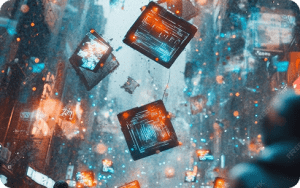By Howard Cleveland Jr of
H. Cleveland Sapphire Quill
Introduction
Science fiction has long been recognized as a fertile ground for exploring complex moral dilemmas and ethical questions, serving as a unique narrative framework that transcends the limitations of our current reality. As a genre rooted in imagination, science fiction creates spaces where writers and creators can project contemporary societal issues into innovative futures, transforming them into compelling narratives that not only entertain but also provoke critical thought. These imagined worlds serve as mirrors reflecting our own moral challenges, allowing us to confront the implications of our choices and beliefs in a context that feels simultaneously foreign and familiar.
At its core, science fiction operates as a speculative lens through which we can examine human behavior, ethics, and the very foundations of our existence. By envisioning scenarios that involve advanced technology, alien cultures, and dystopian societies, the genre encourages us to navigate the complexities of moral decision-making in unprecedented situations. This exploration is particularly relevant in an era where technology is advancing at a breathtaking pace, forcing us to confront ethical questions related to artificial intelligence, genetic manipulation, environmental degradation, and the balance of power in an interconnected world. In this context, science fiction does not Reflect Contemporary Issues
Reflecting On Contemporary Issues.
Science fiction often serves as a mirror to contemporary societal issues, amplifying our ethical considerations and pushing us to confront the moral dilemmas inherent in modern advancements. By projecting current challenges into speculative futures, the genre stimulates critical engagement with issues that may otherwise remain in the periphery of public consciousness. For instance, narratives that explore artificial intelligence (AI), genetic engineering, and climate change compel audiences to grapple with complex moral quandaries surrounding autonomy, consent, and humanity’s responsibility toward the planet.
One prominent example is Philip K. Dick’s “Do Androids Dream of Electric Sheep?” This seminal work challenges readers to reconsider what it means to be human. The novel’s portrayal of androids raises profound questions about consciousness, empathy, and the ethics of creating life. As these artificial beings strive for recognition and meaning, the narrative invites us to reflect on our own humanity: What distinguishes us from machines? Is it our capacity for emotion, or is it the memories and experiences that shape us? In a world increasingly populated by AI technologies, these questions resonate with urgency, highlighting the ethical implications of integrating intelligent machines into our daily lives.




